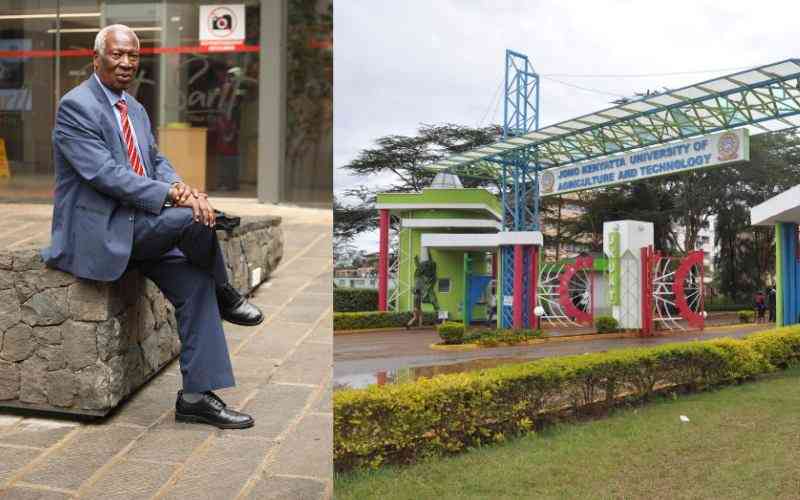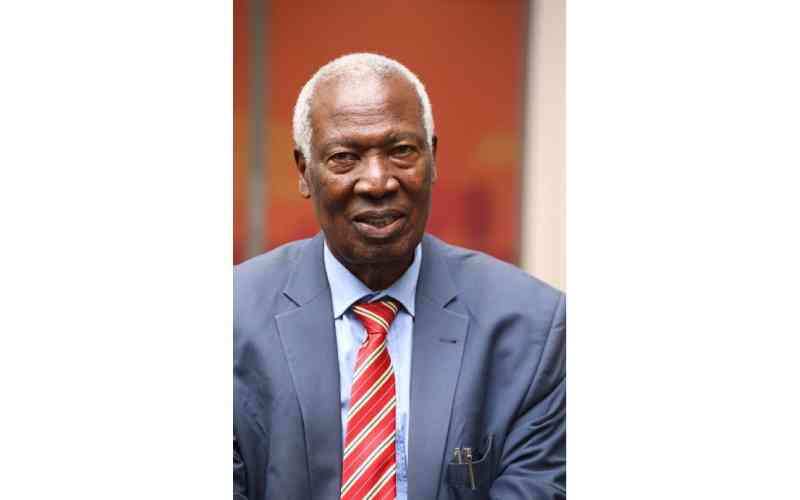
In a cosy nook at The Library, a charming cafe tucked away in Nairobi's Sarit Centre, I find myself in the company of Professor Ratemo Michieka.
He extends his hand to greet me, revealing a Fossil wristwatch. Clocks and watches, he tells me later on, are his most prized possessions.
"Because I want to watch time," he says, his words dancing on the edge of an unintended, yet impressive wordplay.
He has a collection of "maybe more than 10" clocks, each meticulously placed in his home -reminders of his commitments, and testaments to his punctuality.
"Every room I get into in my house, I see a clock," he says. "Not that they do me anything. It is just to alert me about the time. Like you told me to be here at 3pm, and I was here!"
In terms of watches, a metallic Rolex that he owns is his favourite. But Professor Michieka's 73-year life story is not just about watching time - it is a captivating journey through academia, leadership, and a deep-seated commitment to the environment.
Seated at The Library, surrounded by shelves of books that invite patrons to read as they savour their meals, we embark on a voyage through the life of Professor Ratemo Michieka.
The setting could not be more fitting - here, in this sanctuary of knowledge, where the aroma of freshly brewed coffee mingles with the scent of well-worn pages, we unravel the chapters of a man whose story resonates with both intellectual depth and the delicate intricacies of time.
Even as a young boy, he was a stickler for rule-following and discipline. He recalls an incident where he unjustly got into trouble for it as a prefect in primary school.
"Those days, teachers would teach their wives in adult education. I was supposed to report everyone who came in late and they would be whipped, so when this teacher's wife came in late, I reported her," he says.
The teacher completely lost it, and savagely beat him for this, till he was bleeding and swollen in various places, a harrowing incident that he also recounts in his autobiography, Walking the Promise.
"He beat me because I had reported his wife to him," he tells me. "Why did he tell me that those who come in late should be whipped? What was the difference between this student and other students? So other animals are more equal than others. Why was she in my class then?"
That trait was once again evident when he became a banker. The professor did not immediately go to university after his education at Kisii African Government School. After his O-Levels, he qualified to go to forms 5 and 6 but decided to work at Barclays Bank instead.
He was one of "about 30 or 40 people" interviewed by the bank and was one of the 10 who qualified and were posted to Queensway Branch.
"Queensway is Mama Ngina now. I was put in a section called the Intelligence Department. Companies from all over East Africa would apply for loans and it was our duty in that department to verify if they were qualified," he says.
One time, he says a company from Tanzania applied for a loan and did not meet the required threshold, so he disapproved the request, according to the bank's procedures, and despite being pushed by a white higher-up, he refused to approve the loan.
"And that is what I have endorsed up to today. I cannot just sign anything, including certificates of degrees and so on until I have understood it very well in my mind. So that was a very big turning point in my life," he says.
Such incidents, where training and proper procedures are not followed stay with him, but he took the good and learned from the bad.
"What I learned and what I did at that time stayed and made a difference for me for a long period," he says.
As we navigate the conversation, more of Prof Michieka's personality emerges - a blend of impatience, precision, and an aversion to time wastage. "Today? Myself right now? Impatient, and very precise," he says. "And no time wasting whatsoever."
His impatience, he explains, stems from the pace at which human beings, including himself, work. "Each time someone does something wrong," he reflects, "you get a little more impatient and a little more impatient."
His impatience, however, is not born out of unkindness but out of a desire for efficiency and clarity. He chuckles as he recalls his days as a Vice Chancellor when he would encourage students to get straight to the point rather than indulging in lengthy stories.
I tell him that he must have been known as a very tough Vice Chancellor then, but he prefers the terms "realistic" and "predictable." Prof Michieka valued discipline, order, and the holistic development of students. "They always knew what to expect from me," he says.
In his eyes, students were not just learners but also future contributors to society. He wanted them to understand the importance of professionalism, responsibility, and integrity. This philosophy of respecting expertise and valuing clear communication has been a cornerstone of his leadership.
He learned a lot of this from his experience at his alma mater, Rutgers University, which he got a scholarship to and decided to leave Barclays. He studied Weed Science and Environment there.
Despite having a successful academic journey in the US and getting headhunted by giant companies there, he was determined not to stay in the US.
He wanted to work in and help develop Africa, so he returned, successfully working first in Nigeria as a post-doctoral research fellow and then coming back to Kenya as a lecturer at the University of Nairobi (UON) in 1980.
Prof Joseph Maina Mungai, who was the VC at UON then was one of the greatest influences on Michieka's life.
"When he saw me he would call me, 'That weed man, come!' And then each time we would meet, he would train me and tell me about things, only as a lecturer.
One of his favourite memories with Prof Mungai is the story of how the latter brought a cadaver, a dead body, from Uganda in a small Volkswagen to start the Department of Human Anatomy at the School of Medicine in UON in 1967.
"So each time he met the police on the road when they open the boot like this, they would close and say, 'Take it and go!'" he says with a laugh. "He told me that story over and over. We used to be very close. When he went on trips, I would go with him for some business."
He says that the professor's influence on him was simple - dedication, determination and the fact that he never lied. Another influential figure was Prof Josephat Karanja, who became the Vice Chancellor of the University of Nairobi.
While opinions about him varied, Prof Michieka admired his leadership style and the way he did things, appreciating his forthrightness and his commitment to the university.
He mentions many other influences, and in turn, throughout his career, Prof Michieka has also been passionate about mentorship and succession planning. He firmly believes in nurturing the next generation of leaders and imparting knowledge to those who will carry the torch forward. "I knew I would get out of this job anytime," he says, "so I made sure I trained people to take over."
Prof Michieka joined JKUCAT when he was appointed by President Moi as Deputy Principal of the university, then known as Jomo Kenyatta University College of Agriculture and Technology (JKUCAT), in 1989. He then became its principal in 1992.
Elevating JKUCAT into a full-fledged university took a lot of work, a thorough process that took years of laying the groundwork, a process he describes in his book. It is a startling contrast to how universities receive charters nowadays.
He considers this work as his greatest accomplishment. When the university was awarded a charter on December 7, 1994, he became JKUAT's first Vice-Chancellor.

He would spend 13 years at JKuat and is proud of the fact that there were no riots during his time, an issue that plagued other universities then. "Almost 90 per cent of my graduates got absorbed in either industries or their jobs or governments," he says.
His tenure at JKuat would come to an abrupt end in 2003 when President Mwai Kibaki removed him on the eve of graduation and posted him to head the National Environment Management Authority (NEMA).
Despite the abrupt change, he took the zeal he is renowned for to Nema. As former Director General of NEMA, his legacy extends to his dedication to environmental awareness and protection. He passionately recalls the transformation he helped catalyse in Kenya's environmental consciousness through the Environmental Management and Coordination Act of 1999.
He worked tirelessly to address environmental issues, from pollution to deforestation, leaving an indelible mark on the nation's environmental policies. He is however disappointed by what he calls the "total disregard of the law" and corruption regarding environmental issues in the country.
Beyond his professional life, Prof Michieka finds solace and joy in his family. Married for 43 years, he and his wife, Esther Nyabonyi, have raised four accomplished children - two doctors, a lawyer, and an economist.
Today, Michieka is Professor Emeritus, his legacy woven into the fabric of JKuat, where his vision and leadership set the university on a path of excellence, and etched in the nation's environmental policies.
As our conversation draws to a close, one cannot help but admire the intricate tapestry of time that weaves through Professor Ratemo Michieka's life. He is a man whose life story is a treasure trove of wisdom, integrity, and the unwavering pursuit of excellence - a journey that truly transcends time.
 The Standard Group Plc is a multi-media organization with investments in media
platforms spanning newspaper print
operations, television, radio broadcasting, digital and online services. The
Standard Group is recognized as a
leading multi-media house in Kenya with a key influence in matters of national and
international interest.
The Standard Group Plc is a multi-media organization with investments in media
platforms spanning newspaper print
operations, television, radio broadcasting, digital and online services. The
Standard Group is recognized as a
leading multi-media house in Kenya with a key influence in matters of national and
international interest.
